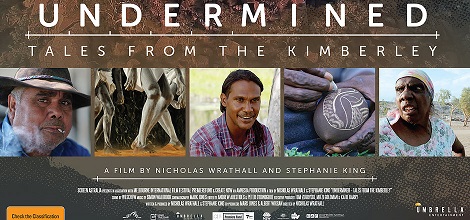
UNDERMINED
Australia, 2018, 90 minutes, Colour.
Directed by Nicholas D. Wrathall.
This is a significant documentary about the Kimberley. The subtitle of the film is “Tales from the Kimberley�. The perspective is that of aboriginal individuals and communities – with many interviews, both women and men.
One thing to note immediately is the vivid photography, the communication of the variety of locations in the Kimberley, the Fitzroy River, water, the cattle properties, the range of desert images, the towns and communities.
The question is raised as to Australians’ general knowledge of the area, the aboriginal people, the developments in the area, especially mining, cattle and agriculture.
There is comment that the developments of the 20th and 21st-centuries can be considered as a new form of 19th century colonialism, the capitalist companies coming in, the establishment of the Northern Land Council and ambiguities, money dealings, political interference… Examples are given of past exploitation and, particularly, of the setting up of a base to process natural gas from the Indian Ocean. There is also the question of the cattle runs and companies coming in setting up contracts with native owners. There is a critique of the effect of agriculture on the land and the environment.
One of the earliest tales from the Kimberley is that of Leopold Downs. The audience is introduced to the genial manager, Kevin Oscar, a man of experience in flying helicopters as well as knowledge of cattle, managing the property but meeting and working with an executive of a company with the plan for collaborative ownership. This begins well – but, unfortunately, later in the film, the scheme collapses, business difficulties and issues of options, bad timing with the cattle, the workers, including Kevin Oscar’s son, having to move to towns or seek out new jobs in the Northern Territory.
We are also introduced to Albert Wiggan, an articulate man who is seen at various meetings, seen at protests, developing skills in native lore as well as having computer and management skills. He is able to fill in some detail about his parents, his going to Perth to a boarding school, being well educated, his marriage, his return to the North, gradually involvement in courses, suspicions of the Northern Land Council, then working with them. He is a skilled communicator as he talks with the interviewer, someone who will contribute to the future of the Kimberley.
On the other hand, there are stories of the towns, young people, nothing to do, alcohol, drug addiction, and the increasing number of young suicides. There is also the destruction by the Western Australian government of an aboriginal settlement and the transfer of all the inhabitants to the towns, to their further decline.
Also appearing and interviewed is the first aboriginal member of the legislative assembly of Western Australia, a woman with constructive views as well as empathy.
So, there are elements of optimism, but also many pessimistic perspectives. One hope offered is the training of young people in the rituals, the dances, stories of the dreamtime, participation in festivals and pride in their ancestry and traditions. (Kevin Oscar also gives the advice that horses are a great advantage, that recalcitrant young boys can learn a lot by having to ride a horse, relate with a horse, take responsibility…).